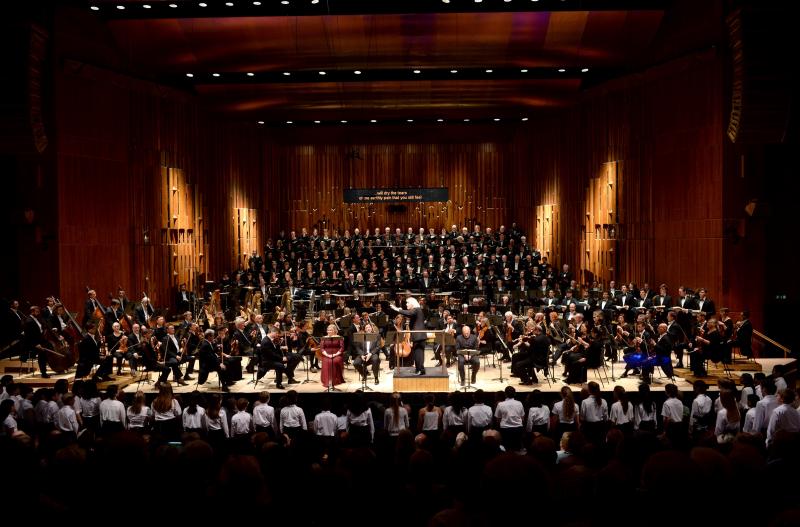La Damnation de Faust, LSO, Rattle, Barbican review - infernal dynamite | reviews, news & interviews
La Damnation de Faust, LSO, Rattle, Barbican review - infernal dynamite
La Damnation de Faust, LSO, Rattle, Barbican review - infernal dynamite
Adrenaline levels still running high for the second instalment of #ThisisRattle

For his monster concerts in 1840s Paris, Berlioz took pride in assembling and marshalling a "great beast of an orchestra". At the Barbican on Sunday night, the LSO filled the stage and fitted the bill.
Cramped acoustic be damned: there was playing here of unabashed violence, backed up by a contribution of thrilling exuberance from the London Symphony Chorus, who appeared to seize their moment like the prisoners in Fidelio, after years of being sidelined and overlooked by Valery Gergiev’s programming.
Not that Rattle’s Berlioz is in hock to the memory of Davis. He turns the screw more tightly. The preludial material of Part 1 simply flew by, and the awkwardly pseudo-operatic construction of Part 2 was rounded and buffed and polished into shape where Sir John Eliot Gardiner, at his recent Prom, had relished the heterogenous character of this unclassifiable "dramatic legend". With his Faust got up as Berlioz and his Marguerite channelling the watery spirit of Ophelia, Gardiner presented an evening packed full of ideas; in as much as the piece ever will, this Faust made sense as the French translation of a German story, written on a hinge turning from Beethoven 9 to Tristan und Isolde. Replacing Gerald Finley at short notice, Christopher Purves made an urbane devil of the world, pitched somewhere between Alberich and Swiss Tony, score-bound for his Song of the Flea and Serenade but resonantly insinuating a power finally unleashed with Faust’s Damnation. The finest singing of the night came from Karen Cargill (pictured above with Bryan Hymel), embodying Marguerite not as a virginal ingénue but an eager lover. From the heartbeat pulse of her King of Thule ballad and the glowing core of her mezzo she drew a portrait of ardent distraction traced at every step by Alexander Nemtsov’s viola – and how lovely it was to hear in their last note a Wagnerian fusion of voice and instrument.
Replacing Gerald Finley at short notice, Christopher Purves made an urbane devil of the world, pitched somewhere between Alberich and Swiss Tony, score-bound for his Song of the Flea and Serenade but resonantly insinuating a power finally unleashed with Faust’s Damnation. The finest singing of the night came from Karen Cargill (pictured above with Bryan Hymel), embodying Marguerite not as a virginal ingénue but an eager lover. From the heartbeat pulse of her King of Thule ballad and the glowing core of her mezzo she drew a portrait of ardent distraction traced at every step by Alexander Nemtsov’s viola – and how lovely it was to hear in their last note a Wagnerian fusion of voice and instrument.
From the profound solitude of Marguerite’s scene to open Part 4 came to mind a pitiful letter written a couple of years before Faust by Berlioz’s son Louis to his aunt, terrified by his father’s absence and his mother’s slide into alcoholic incapacity: "Every day she waits for a letter which never comes." Cargil made it into the still point around which the story turns, while preparing us for the work’s lyric climax in Faust’s great invocation of "Nature immense". This found Hymel in something approaching the heroic stature of his Enée for the Royal Opera’s Trojans after some pinched and strained moments earlier on.
Cargill was not the only one visibly affected by the evening’s closing coup de théâtre, as rank upon rank of children from the Tiffin School gradually filled the floor of the stalls to play their part in Berlioz’s sublimely extended epilogue, which on this occasion was not a bar too long. I would gladly return for the repeat performance on Tuesday just to hear the last five minutes again.
The future of Arts Journalism
You can stop theartsdesk.com closing!
We urgently need financing to survive. Our fundraising drive has thus far raised £49,000 but we need to reach £100,000 or we will be forced to close. Please contribute here: https://gofund.me/c3f6033d
And if you can forward this information to anyone who might assist, we’d be grateful.

Subscribe to theartsdesk.com
Thank you for continuing to read our work on theartsdesk.com. For unlimited access to every article in its entirety, including our archive of more than 15,000 pieces, we're asking for £5 per month or £40 per year. We feel it's a very good deal, and hope you do too.
To take a subscription now simply click here.
And if you're looking for that extra gift for a friend or family member, why not treat them to a theartsdesk.com gift subscription?

Add comment